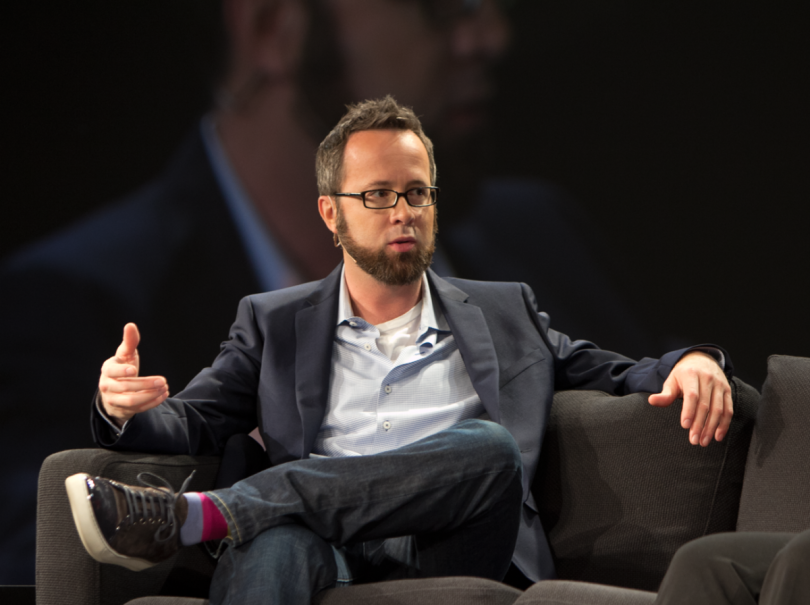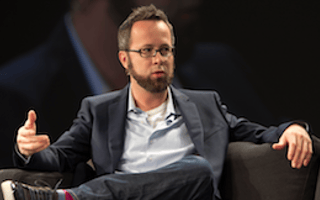
Our Serial Entrepreneur Series sponsored by IBM is a personal look into what it takes to spearhead multiple companies here in Austin. For the third installment of the series, we were lucky enough to sit down with William Hurley, or as he's better known, Whurley.
After climbing the ranks at Apple in the mid-90's, Whurley spent three years at IBM before getting his first taste of startup life as CTO of HireStorm. He went on to create three companies of his own including Symbiot, Chaotic Moon, and Honest Dollar while making stops at InvisiSoft, Qlusters, and BMC Software.
He now serves as a Managing Director at Goldman Sachs after the investment banking giant purchased Honest Dollar in March 2016. We spoke with Whurley to better understand the mindset and work ethic that has brought him to this point in his career.
Built In: Many people realize they have an entrepreneurial spirit at a very young age. Was that the case for you?
Whurley: I never believe people when they’re like, 'When I was 8 years old…' but I probably got it in my early 20s. That was when I was essentially doing consulting work and making some money without having a real employer. When you’re doing the consulting gig, you have to go identify the market, you have to go identify the customers, and you have to sell the customers. Most people who are individual consultants are on a very entrepreneurial endeavor.
Built In: What influence did that mindset have on your career?
Whurley: I think having those entrepreneurial skills is what really propelled my career at Apple. I was at Apple for about six months before I got promoted from answering the phones to running the global training programs online, eventually ending up in R&D. What helped me get promoted two or three times in those few years was that entrepreneurial outlook — always looking to make something better and innovating around it.
Built In: What was the transition like working for someone else to being on your own?
Whurley: I left IBM in 2000 and I joined some other people that were doing a startup in the HR recruiting area. And that was very interesting because that was my first, true startup experience and, to be quite blunt, like many startup experiences it didn’t go very well. So when I went to Symbiot, I used a lot of those experiences that went wrong and it was an easier transition.
It was shocking because I went from IBM, which was very safe, to a startup where I wasn’t making as much and after a few months I began thinking, 'Why did I leave IBM?'”
With the exception of my early career, it's like I went big company-startup-big company-startup... That's been tremendously helpful because entrepreneurs can often be very critical of big companies but [companies] have their infrastructure for a reason. They have their logic for a reason. You absolutely have to understand that a majority of startups aren’t going to make it. It’s nice to compare and contrast the startup experience to the corporate world.
Built In: What are your thoughts on the ever-growing entrepreneurial community? Is it something people should aspire to coming out of college?
Whurley: “I have some harsh opinions on that. It is my opinion — and there is no great way to say it — that’s like saying you’re a rockstar or film maker. And that’s what the tech industry has become now. Silicon Valley is like Hollywood for musicians and actors. Business magazines have become romance novels for entrepreneur geeks. Because we have these rockstar entrepreneurs in society, then these people say 'I’m only an entrepreneur.' I think it’s limiting to say that. But I also think it’s limiting to spend all of your time at a corporation or all of your time at startups.
I don’t think it’s something that’s binary. It’s not really about being an entrepreneur, it’s about being an innovator. 'Having the entrepreneurial spirit.' When most people say that what they mean is you’re innovative. You’re finding new ways, you’re constantly trying to improve upon things. We have now labeled that as what being an entrepreneur is and look at what effect that has had on the corporate world — now companies have incubators and sponsor development camps because they want to tap into that. But what they are really looking for is people that are creative.”
Built In: What advice would you give to aspiring entrepreneurs?
Whurley:
1. The entrepreneur’s credo: Use it up, wear it out, make due or due without.
Being an entrepreneur isn’t about being a billionaire. Being an entrepreneur isn’t about being judged by money or success. Being an entrepreneur is about the entrepreneurial credo and being able to live that. Being able to incorporate stress into your lifestyle that’s not emotionally or physically damaging. Being able to be objective and work with the facts, not emotion.
People always say 'I really want to invest in passionate people!' I’m going to be honest… I don’t know if I want to invest in passionate people. Because you can’t love your own thing too much. When I meet someone who is so passionate about an idea and they’re convinced it’s the best idea that’s going to change the world, I think they lose focus.
2. Data not drama. All about objectivity.
Startups are a team sport. Richard Branson didn’t build his business by himself. Elon Musk certainly didn’t build his business by himself. Steve Jobs didn’t build his business by himself. It’s not about you. It is about finding those smart people and trusting them. It is about being able to relinquish some ownership and control of the idea to people who are more versed. Most of the the entrepreneurs I meet talk about how they’re going to win the Super Bowl and I say, “How are you going to be able to do that with only one person on the field?”
3. Reaction vs. Response.
Responses are voluntary and reactions are involuntary. When Apple had Antennagate. All the press and everyone was talking about it. And Apple didn’t say a peep. And what happened? Weeks later when every other company would’ve said, “We’re checking into it”, Apple didn’t say anything. They didn’t react. They waited weeks and then Steve Jobs got out on stage and said “Well I fixed the way phones work for you, I guess now I have to fix the entire infrastructure.” It was brilliant. It was like, "this is my $100 million antennae facility, it’s the largest one in the world. Do you have one? So I’m pretty sure I know more about this.
Similarly, when people hear that an investor can’t meet with them right now they think, “Oh no, it’s because they don’t want to invest.” You don’t know that! These are very busy people. You have to be patient, this is a very long game.


